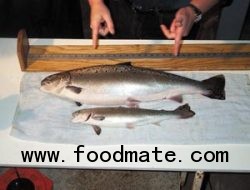
AquaBounty Technologies, Inc.s AquAdvantage salmon is genetically engineered by inserting a Chinook salmon growth-hormone gene, as well as a gene sequence from an ocean pout, which causes the salmon to reach market size in half the normal time.
The Maynard, Mass.-based company had expressed in a securities filing last May it was confident the U.S. Food and Drug Administration (FDA) would approve the fish for human consumption within several months.
Friday's move by the FDA to release the EA clears the way for approval by the agency under its new animal drug approval process. A 60-day comment period is now underway, according to a notice Friday in the Federal Register.
After that, if the agency finds no reason to produce an environmental impact statement, a regulation describing the approval of the GE salmon will be published in the Federal Register.
Public interest groups sharply criticized the FDA's action.
Michael Hansen, senior scientist with Consumers Union, the advocacy and policy arm of Consumer Reports, said consumers won't be able to avoid thes fish if they want to.
"While salmon is required by law to be labeled as to country of origin in supermarkets, this does not apply to fish markets or restaurants," he said. "While in supermarkets consumers could avoid fish from Panama, where this salmon will be grown, they will not have this ability when eating out or buying at a fish store."
Hansen also said there is a big concern over the potential the GM fish can cause allergic reactions because tests of allergenicity were conducted on only six engineered fish and showed "an increase in allergy-causing potential."
Andrew Kimbrell, executive director of the Center for Food Safety (CFS), said: “It is extremely disappointing that the Obama Administration continues to push approval of this dangerous and unnecessary product,” said “The GE salmon has no socially redeeming value; it’s bad for the consumer, bad for the salmon industry and bad for the environment. FDA’s decision is premature and misguided.”
Wenonah Hauter, executive director of Food & Water Watch, said: "To add insult to injury, this product may be hitting the market without labeling, meaning that concerned consumers who have demanded labeling will be unable to identify GE from non-GE salmon. Not only does this ignore our fundamental right to know what we are putting on our plates, it is simply bad for business, as many will avoid purchasing any salmon for fear it is genetically engineered."
AquaBounty claims that the company’s process for raising GE fish is safer than traditional aquaculture, yet documents released by the Canadian government show that a new strain of Infectious Salmon Anaemia, the deadly fish flu which has been devastating fish stocks around the world, contaminated their Canadian production site.
This information was not included in the FDA’s review and hidden from the public. Many additional long standing concerns regarding impacts to wild species and the environment raised during a Senate hearing last year remain unanswered in the latest FDA review documents.
The approval of the GE salmon is despite widespread opposition.
Over 40 members of Congress have repeatedly urged FDA to conduct more rigorous review of environmental and health safety, and halt any approval process until concerns over risks, transparency and oversight have been fully satisfied.
The public filed nearly 400,000 comments demanding FDA reject this application. Additionally, more than 300 environmental, consumer, health and animal welfare organizations, salmon and fishing groups and associations, food companies, chefs and restaurants filed joint statements with FDA opposing approval.
“We need a robust regulatory system that puts environmental, human health, economic and animal welfare risks first,” said Kimbrell. “Putting a GE animal on the path to consumer use without proper safeguards and with no mandatory labeling requirement proves that the system FDA has in place gives us none of that.”
The FDA determined in September 2010 that the GE salmon is safe to eat and does not pose a threat to the environment.
The company expects to harvest the first fish in December.
The company reported a net loss in 2011 of $2.7 million, compared to a net loss of $5.3 million in 2010. The U.S. Department of Agriculture (USDA) gave the company a $500,000 research grant during the year.





